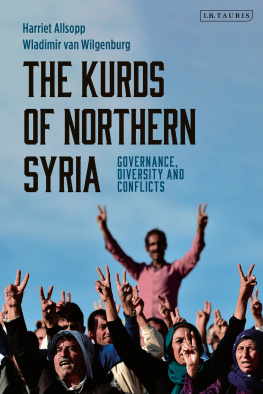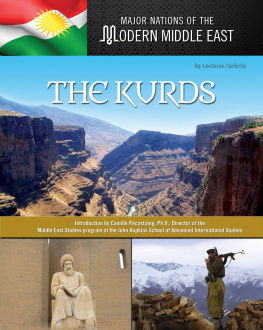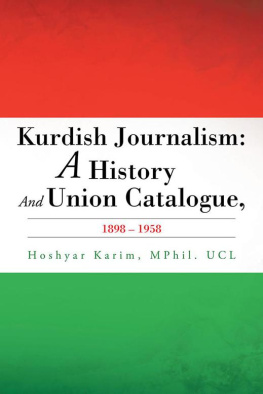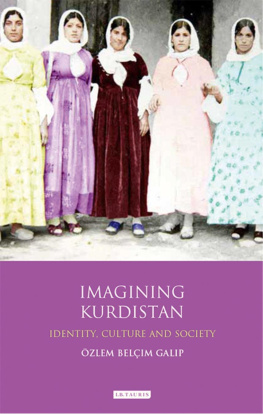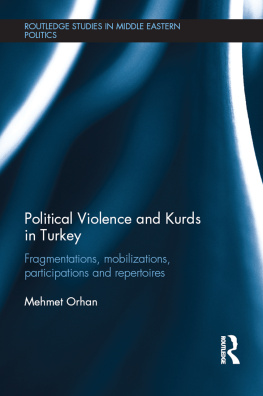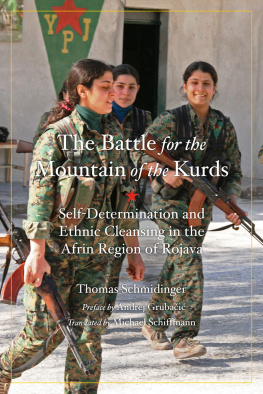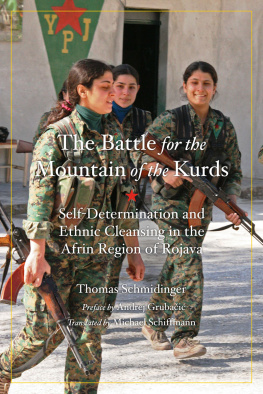The Kurds of Northern Syria
-
The work involved in this and subsequent volumes was carried out with the aid of a grant from the International Development Research Center, IDRC, Ottawa, Canada Iraq Studies (IIST)
The Kurds of Northern Syria
Governance, Diversity and Conflicts
Harriet Allsopp and
Wladimir van Wilgenburg
Volume 2: Governing Diversity: The Kurds in aNew Middle East

Contents
This book is the product of a broad network of individuals, institutions and a team of dedicated researchers, experts and facilitators who have worked tirelessly to realize the aims and objectives of this project on identity and representation of the Kurds. The project was initiated by the Iraq Institute for Security Studies (IIST) Lebanon by the late Dr Faleh A. Jabar, who worked unstintingly to achieve its aims. This book is dedicated to his memory and legacy.
The IIST and authors would like to extend their sincere thanks and appreciation to the International Development Research Council (Canada), which funded this project.
This book on Syria involved many people inside the country, who for reasons of security and safety remain anonymous. Not only translators, drivers, hosts, and reporters who provided assistance and, in some cases, risked their lives but also all those who participated in surveys and shared their experiences and opinions with us. Those individuals, organizations and institutions that we are able to name include Heybar Othman, Can Mirzo, Bashir Talati, Mohammed Hassan, Ekrem Salih, Redwan Bezar, Ehmed Shiwesh, Enwar Omer, Nuvin Ibrahim and reporters from NRT, KNN, Kurdistan 24, ARA news, and ARTA FM. Abdulrahman Dawud who helped distribute and translate surveys. Zuzan Hesen who helped conduct surveys in Kobani. Drivers, Fahad Fatah and Bahri Jammo; the Bali family in Kobani (Jamal, Mahmud and Mustafa Bali); the Kobani hotel and the Qasr Ani hotel for hosting our researcher and for their hospitality and support; all officials, NGOs and others who assisted in the research and surveys.
Field research would not have been possible without access to and freedom of movement within and across northern Syria and the willing cooperation and communication of officials and politicians from within the DAA governance structures, the Kurdistan Region of Iraq and from the political opposition in and outside Syria. Our thanks is extended to the members of the Kobani and Jazirah self-administrations that facilitated access across these two cantons, including Ranya Mihemed, head of media department in Kobani; Alan Osman (former head of media department in Cizere canton) and his successor Dilxwaz Xelil; Arsek Baravi, the head of the Jazirah cantons Media Council; PYD representatives Khaled Issa (France), Sheruan Hasan (Netherlands), Sihanok Dibo (Qamislo), Gharib Hesso (KRG) and Salih Muslim; the Kurdish officials in Kobani: Ayse Efendi, Idris Nassan (now working with a NGO), Anwar Muslim, Ismet Sheikh, Emin Salih (now promoted as head of foreign relations of Kobani) and others; the Kurdish officials in Jazirah canton: Abdulkarim Omer, Abdulkarim Saroxan and Kanaan Berekat; the TEV-DEM and Syrian Democratic Council officials Ilham Ahmed, Hediya Yousef, Abdulsalam Ahmed, and Diyar Qamislo; the SDF and YPG officials: the late Abu Amjad, Sharvan Darwish, Abdulaziz Mahmud, Dr Nasr Haji Mansur, among others; the KNC officials Majdal Delli, Zara Saleh, Mohammed Ismail and others who helped organize meetings with KNC leaders in Syria and in the Kurdistan Region of Iraq and all those politicians and activists who shared their experiences with us; and Amjad Othman, member of the Syrian Democratic Council, and head of the Reform Movement. Thanks also to Nawaf Xelil, head of the Rojava Research Centre; Adib Abdulmajid, founder of ARA news who assisted with help from the Netherlands, and Rodi Naso who helped in Amude.
Courtesy of Aryan Nawzad (@AryanNawzad) and Eduardo Artika(@LCarabinier).

Map 1 The Kurdish demographic spread in northern Syria

Map 2 Syria: Areas of control, June 2017
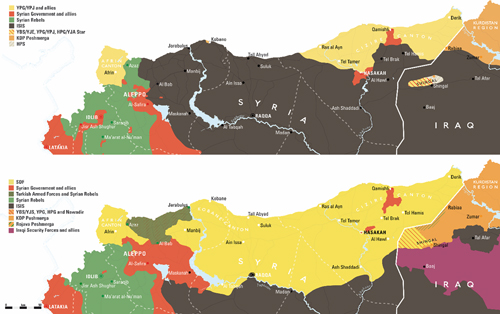
Map 3 Expansion of Kurdish control: December 2014June 2017
This book draws on texts and interviews in English, Arabic, Turkish and in Kurmanji Kurdish. The geographic areas it concerns are also home to a variety of languages, some of which have been politicized due to proscriptions on their public use. Therefore, using one model of transliteration applicable to all place names and organizations has not been possible. As far as possible, places commonly referred to by their Arabic names have been transliterated according to a simplified use of the system employed by the International Journal of Middle Eastern Studies (excluding the use of diacritic symbols). However, common spellings are employed to promote ease of understanding, The spelling Kobani, based on the Kurdish name for the city and surrounding region, came into widespread usage during the siege on the city and is used in this book. It has also been spelt Kobane, and Kubani and referred to by its Arabic name, Ayn al-Arab. For consistency, place names which have a variety of spellings due to local language variations and differences in transliteration models, (such as the Jazirah region, which can also be spelt Jazira, Jezira, Jazeera, or in Kurdish, Cizr) the IJMES model of transliteration, above, is employed. Names of organizations are referred by their most commonly used name or acronym (see glossary of acronyms and abbreviations) so as to be most recognizable and understandable to the reader. Where necessary or appropriate, both Arabic and Kurdish names are given. Peoples names are generally written as they, themselves, would have them transliterated.
Bibliographic References
Due to the current and changing subject matter, research for this book involved constant monitoring of events on the ground in Syria through field research, respondents and through live news and opinions published on the internet. As a result, several news resources have been cited in this work. Sources have been provided to verify facts which may not be widely known and to gauge as wide a possible impression of opinions of people in the regions. These sources have been corroborated as far as possible through field observations, interviews and other open source materials. News sources are cited within the footnotes, while other sources, including academic literature, publications by think tanks and organizations, political documents and interviews are listed in the bibliography.
1957 genealogy of parties :
the group of Kurdish political parties that trace their origins to the founding of the first Syrian Kurdish political party in 1957. |
Asayish: | Asay. The police force of the Democratic Autonomous Administrations (DAAs, also referred to as the cantons). |
SCP: | Al-Hizb Al-Shuyui Al-Suriy, The Syrian Communist Party, formed in 1944. |
Democratic Autonomous Administrations (DAAs):

